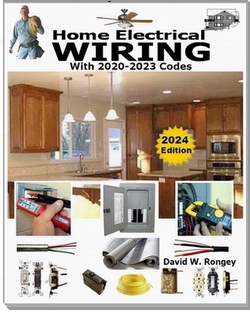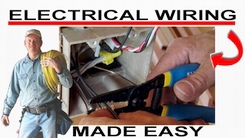» Home Electrical Wiring
» Electrical Wiring Directory
» Electrician Training
» Need Electrical Help? Ask the Electrician
» Electrician Training
» Need Electrical Help? Ask the Electrician
Checklist for Hiring a Electrician

|
Summary: Avoid problems with your home improvement electrical project by hiring the right person for the job. This checklist will help you make sure that your contractor measures up. © By: Dave Rongey |
10 Tips to Make Sure Your Electrical Contractor Measures Up |
| 1. Hire only state licensed contractors. If your "electrician" or "contractor" is not licensed and something should go wrong with your project then you may have very little recourse. Professional electrical contractors are licensed by the state licensing bureau or governing agency. If something goes wrong on your project then you may choose to file a complaint. Complaints are typically verified and inspected and if found to be valid can result in fines, suspensions or loss of license to the offending contractor. If your "electrician" or "contractor" does not have a license, then he or she has nothing to lose. |
|
| 2. Check a contractor's license number online or by phone. A contractors license may be verified by contacting the local state contractors licensing department either by phone or using the internet. This gives you the ability to make see if the license is up to date or not. You may also be able to see if there have been any complaints filed against the contractor. |
|
| 3. Get at least three bids. Three bids will be very helpful to compare the contractors and proposed work. If you see a large difference between the bids you may ask questions about the reason why and enquire about the type of materials that will be installed. Make sure the bid is itemized and pay close attention to items such as light fixture types and styles to make sure you are getting the quality that you desire. An itemized bid will help you understand what the contractor plans to do. This will avoid the possibility of "underestimating" the job which can result in unexpected expenses in order to get the contract. |
|
| 4. Get three references from each bidder and review past work in person. Obtaining references is vital, especially if they compare to the same type of work you need to have done. If the company cannot produce these references then you may have a cause to be suspicious. |
|
| 5. Make sure all project expectations are in writing and only sign the contract if you completely understand the terms. A full set of plans describing the project with specific information may be required in order to bid the project accurately. The plan should include information relating to specific equipment that may require a dedicated power circuit for special equipment. Review the itemized list of materials where less expensive but comparable or equivalent materials may be used to reduce the cost of the project. Be aware that sometimes such items are used to increase the contractor's profit. Make sure that you are getting what you are paying for and that you are not paying any more than you have to. Be sure that you are aware of all of the options such as the style and color of receptacles and switches. Do you desire regular or the stylish type, such as Decora, and do you want the light fixtures to be controlled by a dimmer switch, if so what kind of dimmer controls would you like? Contractors have options that may allow you to get more for your money just by asking the right questions |
|
| 6. Confirm that the contractor has workers' compensation insurance for employees. Most state laws require workers to be covered with compensation insurance, however the Sole Owner of a Business or a One Man Shop may not required to have workers compensation insurance. If your area requires the company to carry workers compensation insurance for their employees then they must prove that they do, otherwise they are violating the law. Keep in mind that if a worker gets hurt on your job and there is no workers compensation insurance in place then you may be held liable. In most areas contractors should have a minimum $1,000,000 general liability policy. If they do not and something should go wrong then you may be held liable. |
|
| 7. Never pay more than 10% down or $1,000, whichever is less. Don't pay in cash. Along with the itemized quote or bid proposal the selling price should be clearly displayed showing that 10% will be required at the acceptance or signing of the contract. In most cases the project will not begin until this payment has been received. Pay close attention to the language used in the proposal contract for a full understanding. |
|
| 8. Don't let payments get ahead of the work. The proposal contract should show any scheduled progressive payments that will become due and payable during certain phases of the project. For example 30% may be due when the rough or first inspection has taken place and the inspection has passed. Any changes such as the deletion or the addition of circuits or devices should be written up in a Change Order which documents the change specifically, including the cost or credit for parts and materials and the associated labor. In most cases, if the change order is an addition to the project a payment may be required, and any additional time may need to be factored into the timeline of the entire project. |
|
| 9. Keep a job file of all papers relating to your project, including all payments.
Be sure that the time schedule is as specific as possible whether your project is large or small. Ask the contractor what they plan to do when and when they plan to finish each phase of the project. Make sure that you understand the description of what will be done, and that the timeline relates to the time estimate that was given to you. |
|
| 10. Don't make the final payment until you're satisfied with the job. The project must have passed the final inspection and all necessary components that were not covered by the inspection, such as low voltage devices should be installed before the final payment has been made. If there has been a delay in receiving special finish or trim parts then allow for these expenses and discuss them with the contractor. |
Contact your state or area for their specific guidelines. |
| Be sure to get your copy of my BIG Book: | ||

|
||
|
Be sure to get your copy of my BIG Book:
Perfect for Homeowners, Students and Electricians Includes: Home Electrical Wiring - Room by Room 120 Volt Circuits 240 Volt Circuits Multi-Wired Circuits Wiring Methods for Installing Home Electrical Circuit Wiring Electrical Codes for Home Electrical Wiring ....and much more. |













